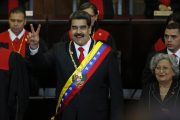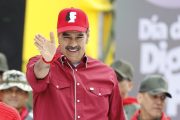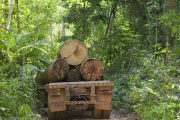
Apparently all of that “anti-imperialist” rhetoric from Caracas was just a farce for public consumption. As Venezuela’s economy implodes amid skyrocketing inflation and crippling shortages of practically everything, Socialist strongman Nicolás Maduro (shown) has a new plan to prop up his imploding regime: annex two thirds of neighboring Guyana’s territory and almost one third of its population. The area eyed by Maduro’s autocracy is especially noteworthy now that potentially lucrative oil deposits have been discovered offshore. Unsurprisingly, a powerful alliance of the region’s socialist strongmen and their allies has sided with the regime in Venezuela. Talk of war is escalating. Now, the United Nations is getting involved, too.
The fresh dispute over the massive stretch of Guyana’s territory, known as the Essequibo region, first flared up again in June. Maduro, faced with a domestic uprising among impoverished and oppressed citizens, issued a presidential decree purporting to claim sovereignty over the entire 65,000 square miles of Essequibo, which accounts for the overwhelming majority of Guyana’s landmass and some 200,000 of its 750,000 citizens. Also included in the area claimed by Maduro is the vast stretch of ocean where energy giant Exxon-Mobil, under contract with Guyanese authorities, recently announced the discovery of oil. Maduro outlined a “defense” zone offshore that, if allowed to stand, would reportedly block Guyana’s access to the Atlantic Ocean.
The decree by Maduro came just weeks after the U.S. energy company found the oil deposits. To stake his claim, Socialist strongman Hugo Chávez’s successor started off by sending a letter to Exxon-Mobil “informing” the company of his claim. Maduro and his allies have claimed the oil company is the “main aggravating factor” contributing to the escalating tensions. The regime’s leaders have repeatedly pledged to solve the escalating dispute using “peaceful” means. However, Maduro also set up an “Office for the Rescue of the Essequibo” led by a retired senior military official to help seize the land, its resources, and its population.
Among other schemes, the regime’s “rescue” office plans to provide Venezuelan government identification cards to the Guyanese citizens living in the region. Considering the meltdown of Venezuela’s economy and its accelerating attacks on the fundamental rights of citizens, it was not clear why Caracas thinks those Guyanese would even want to become Venezuelan at all. To solve that potential obstacle, the regime’s taskforce for seizing the Essequibo region is plotting a massive advertising campaign targeting residents aimed at “approaching them, getting to know them, winning them over and earning their love,” said Pompeyo Torrealba, the ex-army colonel in charge of the effort.
In mid-June, Maduro also created the “Presidential Commission for Border Issues,” another regime outfit that will focus its efforts on taking over most of Guyana under the guise of solving “border issues.” Despite platitudes about achieving victory peacefully, Maduro appointed another senior military officer, General Gerardo Izquierdo, to oversee the new commission and its efforts.
According to news reports, the Venezuelan regime approached UN Secretary-General Ban Ki Moon to request assistance in seizing the land as well. The UN boss reportedly plans to appoint a “Good Officer” to help sort out the issue, in addition to creating a commission that will visit both countries, according to media reports and official statements. Efforts are said to be underway to organize a meeting between Maduro and his Guyanese counterpart at the upcoming UN General Assembly meeting in New York City this September as well.
Maduro has also started lashing out at the Guyanese government and especially its president, fellow socialist David Granger, accused by the Venezuelan strongman of “aggressive provocation.” “Sooner or later he will have to rectify a position that hurts the very people of Guyana,” Maduro argued, promising the people of Venezuela a “great victory” against their neighbor even as Venezuelans waited for hours outside of empty stores just to get some meager food rations, medicine, and toilet paper in between anti-Maduro rallies. “We are going to take back what our grandparents left for us.”
Guyanese leader Granger hit back, vowing to defend Guyana’s territorial integrity but warning of the implications of Caracas’ actions. “Guyana at the moment is facing a challenge to its survival by a larger state,” the Guyanese president and former military chief said recently at the William Perry Center of Hemispheric Defense Studies at the U.S. National Defense University. “The present threat, if not resolved promptly, if not resolved permanently, if not resolved peacefully could lead to deterioration of the security situation in the entire Caribbean and on the northern tier of the South American continent.” Guyanese authorities have proposed letting the International Court of Justice resolve the issue.
The origins of the recently resurrected “dispute” go back to 1899, when Guyana, then a British colony known as British Guiana, was awarded the vast Essequibo region by an international arbitration court. More than six decades later, Venezuela contested the decision, ending in a 1966 treaty among the governments of Great Britain, Venezuela, and British Guiana vowing to resolve the issue peacefully. Shortly after the treaty was signed, Guyana gained independence from London. The “dispute” largely fell by the wayside, though, even during the Chávez years when Maduro served as the regime’s foreign minister, until being resurrected after the oil discovery in May. Virtually the entire world recognizes Guyanese sovereignty over the territory.
While some of the Venezuelan opposition has apparently expressed support for Maduro’s antics in the rubber-stamp legislature, even critics within Venezuela have publicly questioned the strongman’s motives. “Nicolás [Maduro] was chancellor for six years [in the Chávez regime] and now he notices that we have a disputed territory. Who can believe him?” wondered Henrique Capriles, a Venezuelan opposition leader and the governor of the state of Miranda, in a series of Twitter posts. “This is not a Guyana problem, the [Maduro] government wants to divert the public’s attention from the major problems we have in the country.”
Venezuela’s former UN ambassador for the implementation of the 1966 treaty, Emilio Figueredo, has also spoken out. “This is a new way in which the Venezuelan government is looking for the famous foreign enemy,” Figueredo told VICE News. “First they tried with Obama, then with Spain. Since they’ve yielded no results, now they’re trying with Guyana’s president.” Figueredo also said the letter sent to Exxon-Mobil from Caracas about the Venezuelan claims should have been addressed to Guyanese authorities rather than an oil company.
Guyana is a small, poor country in northern South America with relatively few valuable natural resources. The Socialist Venezuelan regime, by contrast, which rules over 30 million people with an iron fist, controls potentially the largest oil reserves on the planet — yet still struggles to keep the electricity running even in the capital city. But with oil prices currently below $50 per barrel, and with almost all of Venezuela’s export revenues coming from oil, the embattled Maduro regime is under major pressure. Nationwide protests have now become a threat to his regime’s survival, despite Maduro’s efforts to quash the opposition using bullets, torture, censorship, propaganda, and jails.
More than a few analysts have suggested that Maduro is either desperate for more revenue to prop up his imploding regime, or desperate to rally the public behind a foreign adventure to distract from the escalating turmoil and misery at home. It may be a combination of both. Shortly after Maduro’s decree was announced, Guyanese Minister of Foreign Affairs Carl Greenidge blasted it as an “attempt to achieve by questionable means what Venezuela has so far failed to achieve by internationally accepted legal and diplomatic approaches.” But it is probably much more than that.
Either way, the situation is becoming explosive. With Maduro following in the footsteps of his totalitarian mentor Hugo Chávez as Venezuela collapses due to the socialist regime and its antics, the dispute with Guyana has the potential to become even more dangerous. Already, citizens on both sides of the border are talking of preparations for war. The Foro de São Paulo network of socialist autocrats and Marxist narco-terrorists is rallying behind its sugar-daddy Maduro. The people of Guyana, meanwhile, are rallying against Venezuela. Perhaps Maduro should worry about dealing with Venezuela’s accelerating collapse before trying to expand his impoverished Socialist fiefdom by seizing most of Guyana.
Photo of Venezualan President Nicolás Maduro: AP Images
Alex Newman, a foreign correspondent for The New American, is normally based in Europe. Follow him on Twitter @ALEXNEWMAN_JOU. He can be reached at [email protected].
Related articles:
Venezuelan Military Occupies Stores; Customers Seize Scarce Groceries
In Venezuela, Anti-Tyranny Uprising and Death Toll Grow
Socialist Regime in Venezuela Kills Students, Arrests Opposition
Socialist Venezuela Spirals Into Chaos as Troops Seize Companies
Resurgent Communism in Latin America
U.S. Ambassador Outs Powerful Totalitarian Cabal in Latin America
Venezuela Erupts into Chaos After Election
Chávez Dead, But Latin American Socialism Lives On
Amid Accusations of Fraud, Socialist Chávez Wins Election
Exposure of Radical CFR Latin America Boss Offers Broad Insight
With UN Support, Socialist Chavez Disarms Civilians in Venezuela
Chavez Threatens Banks and Land Owners Refusing His Orders




